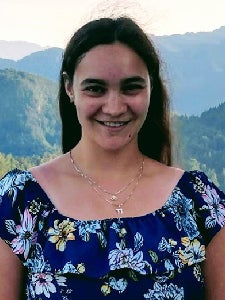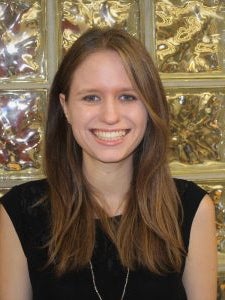PAREKH FAMILY FELLOWS
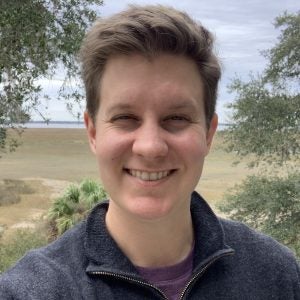 Harrison Bray (2019-2020)
Harrison Bray (2019-2020)
My research is in geometry and dynamical systems. In one corner of my work, I study topological and geometric properties of the Thurston set, which is defined by dynamical objects. On the flip side, I also enjoy studying the geodesic flow, a dynamical system, using geometric methods. Topics of particular interest to me include convex projective geometry, Patterson-Sullivan theory, and volume entropy rigidity. I enjoy bringing undergraduates closer to my research via computation and examples.
As an educator, I strive to transform the relationship my students have both with math and each other. An IBL classroom is a special environment, where I have the opportunity to carefully attend to and shape a community space in which failure and success are equally valid and valued. In an ideal outcome, students are able to overcome their latent socialized fears and anxieties surrounding mathematics, and leave my classroom perceiving mathematics as a communal, creative discipline, to which they themselves have contributed. Especially for my younger students, I hope that my classroom is only the beginning of an exciting, fulfilling, and rewarding mathematical journey.
Bray holds an Assistant Professorship of Mathematics at George Mason University. Besides teaching and research, he also directs the Mason Experimental Geometry Lab.
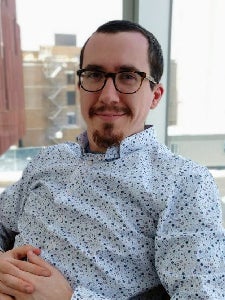 Eric Canton (2018-2020)
Eric Canton (2018-2020)
My broad research areas are algebraic geometry and commutative algebra. I am interested in interactions between ideas originating in tight closure theory, birational geometry, and Berkovich analytic spaces associated to algebraic varieties.
My interest in Inquiry-Based Learning comes from my desire to foster deep creativity, analytical thinking, and mathematical agency in my students. I want to make my classrooms a place that empowers students, while disrupting traditional societal notions of who can and who cannot do mathematics.
During his postdoctoral fellowship, Eric Canton got involved in the mathematics and modeling of circadian rhythms. He now works for Arcascope developing models and apps for sleep rythms, and mentoring newer team members.
Sunita Chepuri (2020-2022)
My research is in algebraic combinatorics, especially problems relating to total positivity and cluster algebras. My current projects include work on Kazhdan–Lusztig immanants, linear LP-algebras, arborescences of covering graphs, and the geometric R-matrix.
My primary goals as an instructor are teaching problem solving, helping my students believe that they are capable of doing math, and expanding my students’ conceptions of math as a subject. IBL provides a great framework for all of these because it encourages students to explore math. It teaches students how to learn themselves, which is an important lifelong skill that translates across subjects.
Chepuri is an Assistant Professor of Mathematics at Lafayette College.
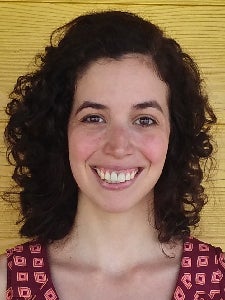 Eva Elduque (2019-2021)
Eva Elduque (2019-2021)
My research interests are in the field of singularities, which lies in the intersection of topology and complex algebraic geometry. The objects I study are complex algebraic varieties, and I care about aspects of their topology as complex analytic spaces. In particular, topics that I’ve studied in the past and/or I am currently interested in include Alexander-type invariants of affine hypersurface complements, intersection homology, stratified Morse theory, and mixed Hodge structures.
In my opinion, the most important piece of advice that I have given students in the past is that the way one gets better at math is through trial and error. You need to be willing to try out different approaches to solve a problem, because understanding why some of the attempts you have tried ended up failing actually deepens your knowledge of the problem and makes you more likely to end up solving it. I am very excited to teach IBL because it provides that framework in which thinking critically and trying things out for yourself is encouraged.
Elduque is Assistant Professor of Mathematics at Universidad Autónoma de Madrid and a member of ICMAT, the Institute of Mathematical Sciences in Madrid.
 Nate Harman (2022-2023)
Nate Harman (2022-2023)
My research interest is in stability phenomena in representation theory, tensor categories in positive characteristic, representations of infinite rank arithmetic groups, applications of model theory to representation theory, and problems in algebraic combinatorics arising from representation theory.
I first experienced IBL as a student, and the experience was one of the major reasons I decided to go into mathematics. Making conjectures, formulating definitions, testing examples and counterexamples, being wrong, formulating better definitions, correcting and refining conjectures, being less wrong, explaining ideas to your peers and incorporating their thoughts into your approach — to me these are all key aspects of the mathematical process that are often overlooked in traditional classrooms, but are embraced by IBL. I’ve been teaching IBL at summer camps and weekend math circles for years now, and I am thrilled to be coming to UMichigan as an IBL Fellow.
Harman is Assistant Professor of Mathematics at the University of Georgia.
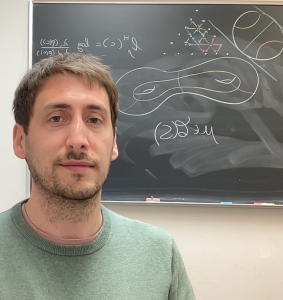 Giuseppe Martone (2021-2022)
Giuseppe Martone (2021-2022)
My research interests lie at the interface of geometry, topology and dynamics. I use a variety of tools (e.g., cluster algebras, Thermodynamic Formalism, Euclidean buildings) to study Anosov representations of surface groups. Their images provide interesting examples of discrete subgroups of high rank semi-simple Lie groups.
My first experience with IBL was as an instructor at the University of Michigan. IBL helped me frame my overarching goal as an educator, which is to help my students value the process of understanding mathematics while nurturing an active and inclusive learning environment. IBL was a great vehicle for this: while working as a team on challenging problems, students recognize and combine their collective expertise and strengths to reach a solution.
Martone is Gibbs Assistant Professor of Mathematics at Yale.
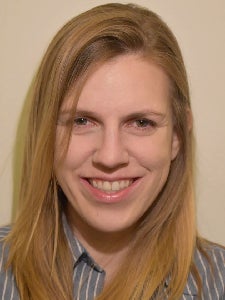 Janet Page (2019-2022)
Janet Page (2019-2022)
My research interests are in commutative algebra and algebraic geometry, and I am especially interested in problems which can be solved using combinatorial techniques. In the past, I’ve mainly working on problems related to singularities of algebraic varieties in positive characteristic.
My first experience with leading an inquiry based classroom was in teaching for an outreach program called the Math Circles of Chicago, where middle and high school students investigate mathematics in a collaborative environment, often through puzzles or games. Here, I learned how to step back and give my students space to discover mathematics on their own, and this technique has translated well into the college classroom. I’ve found that when students guide the discussion and work together on problems rather than just listening to lectures, they develop their critical thinking skills, learn the material better, and have a greater sense of agency.
Page is Assistant Professor of Mathematics at North Dakota State University.
Anna Weigandt (2018-2021)
I study algebraic combinatorics, specifically Schubert calculus. At its heart, Schubert calculus concerns the way arrangements of geometric objects, such as points, lines, and planes, sit in space together. More broadly, I seek to understand how mathematical structures in algebra, combinatorics, and geometry relate to one another. I am most interested in problems involving partitions, alternating sign matrices, and quiver representations.
My previous teaching experience has been with Precalculus, Calculus I, and Vector Calculus. I find that personally, when I figure something out for myself, I am much more likely to understand it. This is why I am so excited to teach in an IBL setting. My goal is to teach students how to think creatively within the mathematics classroom. I am also interested in using technology to understand mathematics. I have developed a number of digital visualizations, geared towards helping students to gain intuition about key calculus concepts.
Weigandt is Assistant Professor of Mathematics at the University of Minnesota.
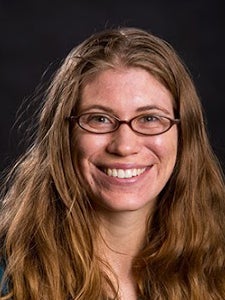 Rebecca Winarski (2019-2020)
Rebecca Winarski (2019-2020)
My research applies topological and group-theoretic methods to study problems in complex dynamics and topology. The central object of my research is the mapping class group of a surface, which is a group that describes the symmetries of a surface. I am interested in using the techniques involved in the study of mapping class groups to classifying the dynamics of polynomials and rational maps.
My overarching goals in teaching are to help students develop tools to think logically, critically analyze information or arguments, solve problems, learn new mathematical and reasoning skills, and self-assess. By focusing on the process of learning, I hope that students develop confidence in their current abilities and their potential to improve. My experience teaching inquiry based learning (IBL) classes at the University of Michigan has convinced me that IBL classes provide a solid framework for students to build connections between concepts, recognize errors in arguments, collaborate with each other, and reflect on the mathematical process.
Winarski is an Assistant Professor of Mathematics at the College of Holy Cross.
DESAPIO FELLOWS
 Nir Gadish (2021-2023)
Nir Gadish (2021-2023)
I am interested in combinatorial aspects of topology and representation theory, such as problems involving configurations spaces and moduli spaces of curves equipped with an action of symmetric groups. A particular set of problems I like are ones involving representation stability – asking about asymptotics of sequences of representations of varying groups.
My favorite thing about teaching mathematics is watching students face a new problem with the confidence to experiment and make mistakes on their way to an original solution. I found that IBL formats are an incredible platform for developing students’ confidence in their own abilities, and familiarizing them with the emotional challenges involved in problem solving. My past and present experiences of leading active learning classrooms at UChicago, MIT and the UofM helped me gain insight into students’ learning processes, gauge when I can constructively push my students, and form meaningful connections with them.
Gadish is Assistant Professor of Mathematics at the University of Pennsylvania.
 Aida Maraj (2022-2023)
Aida Maraj (2022-2023)
My research is in algebraic statistics and representation stability. In algebraic statistics, I investigate quantitative and qualitative data for both discrete and multivariate Gaussian statistical models using associated ideals and varieties over polynomial rings. On occasion, this involves the polyhedral geometry of the associated polytopes. In representation stability, I focus on asymptotic phenomena for infinitely many algebraic objects related by a group action. In doing so, I often utilize theory of languages and automata from computer science.
In my opinion, a good descriptive name for an IBL experience is supervised discovery. While learning the material, the student in an IBL class masters problem solving abilities: clearly stating a problem, splitting a problem into smaller simpler tasks, creative thinking, resilience, initiative, and collaboration. In my experience, the IBL setting makes for a more energetic, exciting, and happy class atmosphere.
 Janet Page (2019-2022)
Janet Page (2019-2022)
My research interests are in commutative algebra and algebraic geometry, and I am especially interested in problems which can be solved using combinatorial techniques. In the past, I’ve mainly working on problems related to singularities of algebraic varieties in positive characteristic.
My first experience with leading an inquiry based classroom was in teaching for an outreach program called the Math Circles of Chicago, where middle and high school students investigate mathematics in a collaborative environment, often through puzzles or games. Here, I learned how to step back and give my students space to discover mathematics on their own, and this technique has translated well into the college classroom. I’ve found that when students guide the discussion and work together on problems rather than just listening to lectures, they develop their critical thinking skills, learn the material better, and have a greater sense of agency.
Page is an Assistant Professor at North Dakota State University.
Anna Weigandt (2018-2021)
I study algebraic combinatorics, specifically Schubert calculus. At its heart, Schubert calculus concerns the way arrangements of geometric objects, such as points, lines, and planes, sit in space together. More broadly, I seek to understand how mathematical structures in algebra, combinatorics, and geometry relate to one another. I am most interested in problems involving partitions, alternating sign matrices, and quiver representations.
My previous teaching experience has been with Precalculus, Calculus I, and Vector Calculus. I find that personally, when I figure something out for myself, I am much more likely to understand it. This is why I am so excited to teach in an IBL setting. My goal is to teach students how to think creatively within the mathematics classroom. I am also interested in using technology to understand mathematics. I have developed a number of digital visualizations, geared towards helping students to gain intuition about key calculus concepts.
Weigandt is currently an Instructor in Mathematics at MIT.


